

The Illinois Bar Exam adopted the Uniform Bar Exam (UBE® ) on June 8, 2018, and began administering it in July 2019. The UBE is broken into 3 sections—the Multistate Bar Examination (MBE®), the Multistate Performance Test (MPT®), and the Multistate Essay Examination (MEE®). The UBE has been adopted by 41 jurisdictions to date, enabling successful examinees to transfer scores more easily between jurisdictions. This article provides everything you need regarding IL Bar Exam results, dates, deadlines, fees, applications, and more.
The Illinois Board of Bar Examiners has announced that it will begin administering the NextGen bar exam in February 2028.
The MEE is weighted at 30% of the UBE. Examinees will have 3 hours to answer six 30-minute essay questions on the afternoon of the first exam day.
The MPT is weighted at 20% of the UBE and administered on the exam's first day. Examinees have to complete two items in 90 minutes each using a file of legal materials.
The MBE is weighted at 50% of the UBE and consists of 200 multiple-choice questions administered in 2 three-hour sessions on the second exam day.
Preparing your application for the Illinois Bar Exam and submitting it before the first deadline will save you hundreds of dollars. See below for important deadlines, dates, and fees.
The first fee schedule below includes a mandatory $450 registration fee for character and fitness registration applications. For example, the “first filing” fee is $500 before the added character and fitness fee.
| HAVE NOT previously registered for an IL Bar Exam | |||
|---|---|---|---|
| Filing Deadlines | February 25-28, 2025 | July 29-30, 2025 | Fee |
| First Filing | September 15, 2024 | February 15, 2025 | $950 |
| Timely Filing | November 1, 2024 | April 1, 2025 | $1,150 |
| Late Filing | November 30, 2024 | April 30, 2025 | $1,450 |
| HAVE previously registered for an IL Bar Exam | |||
|---|---|---|---|
| Filing Deadlines | February 25-28, 2025 | July 29-30, 2025 | Fee |
| First Filing | November 1, 2024 | April 30, 2025 | $500 |
| Timely Filing | November 30, 2024 | X | $850 |
Applicants seeking to sit for the Illinois Bar Exam must have completed a minimum of 90 semester hours at a college or university approved by the Board of Admissions to the Bar or from a program commensurate with such standards. In addition, applicants must obtain a JD from an American Bar Association (ABA) approved law school.
Additionally, you must prove that you are of good moral character and fitness by filing a character and fitness application with the Board of Admissions.
To schedule your IL State Bar Exam, you must complete a 2-part application consisting of (1) an online application and (2) paper documents that must be sent to the Illinois Board of Admissions to the Bar. These documents must include the following:
You can begin the application process at the Illinois Board of Admissions website.
Payments must be made with a credit or debit card (Mastercard, Visa, or Discover) following completion of your application or with a cashier’s check, certified check, or money order in US dollars. All filing fees are nonrefundable and cannot be transferred. If your payment is not received by the filing deadline, your application will be considered invalid.
With filing fees and exam preparation costs, gaining admission into any bar can be expensive. Thankfully, options such as scholarships and grants are available to mitigate your fees or avoid paying for them yourself.
For example, the Chicago Bar Foundation awards scholarships and fellowship programs. Other Illinois Bar Exam cost-saving resources include:
As an Illinois Bar Exam applicant, we encourage you to explore these and other resources and apply to as many available scholarships for which you are eligible

The IL bar exam tests an examinee's ability to analyze and reason alongside their knowledge and understanding of fundamental legal principles. Furthermore, since Illinois administers the UBE, a successful exam score represents one's competency and readiness to practice law in all other participating jurisdictions.
Some MEE subjects may be tested together. Others may not be tested at all. For example, Civil Procedure has been tested on almost every MEE for the past ten years, while Criminal Law has only appeared a few times. Questions are designed to assess your ability to:
| MEE Subjects | |
|---|---|
| Business Associations | Evidence |
| Civil Procedure | Family Law |
| Conflicts of Law | Real Property |
| Constitutional Law | Secured Transactions |
| Contracts | Torts |
| Criminal Law & Procedure | Trusts & Estates |
Learn More
The MPT is designed to test an examinee's "lawyering skills" using only the materials provided: detailed instructions on completing the case, documents containing relevant and irrelevant facts, and relevant and irrelevant legal authorities required to complete the case.
These tasks are conducted in a closed-universe, fictional jurisdiction called "Franklin." The laws of the real world do not apply, so your critical thinking skills and understanding of fundamental legal principles are key.
| MPT Abilities Tested | |
|---|---|
| Sort through the detailed factual materials. | Separate relevant/irrelevant facts |
| Analyze statutes, cases, and administrative materials. | Identify and resolve ethical dilemmas. |
| Communicate effectively in writing. | Complete a lawyering task within time constraints. |
Learn More
The MBE evaluates a bar applicant's ability to apply fundamental legal principles and legal reasoning to analyze given fact patterns. It contains 200 multiple-choice questions divided evenly over 7 subjects. You'll notice that 7 x 25 does not equal 200. That's because 25 MBE questions are unscored questions that act as field tests for future exams.
| MBE Subjects | |
|---|---|
| Civil Procedure | Constitutional Law |
| Contracts | Criminal Law and Procedure |
| Evidence | Real Property |
| Torts | |
Learn More
Quality speaks for itself. Try some of our free MBE sample questions below.
Select a Question sample.Select a Question sample.
A husband and wife were married in State A and lived there for 10 years before separating. One month later, the wife permanently moved to State B and immediately filed for divorce in a federal court in State B. The wife claims that she is entitled to $300,000 in alimony. The husband appeared in the action and has filed a motion to dismiss for lack of subject-matter jurisdiction.
Should the court grant the motion?
Federal courts cannot exercise diversity jurisdiction over cases involving:
A federal court must possess subject-matter jurisdiction to hear the merits of a case before it. Subject-matter jurisdiction can be established through either:
Here, diversity jurisdiction is established since the wife claims that she is entitled to $300,000 and the parties are citizens of different states (States A and B). However, federal courts cannot exercise diversity jurisdiction over cases involving probate matters or domestic relations. Instead, state courts have exclusive jurisdiction over these types of actions (Choice A).* Therefore, the husband's motion to dismiss should be granted.
*The probate and domestic-relations exceptions exist because states have a strong interest in these substantive areas and are more qualified to deal with the constant judicial involvement these types of cases require.
(Choice B) A challenge to subject-matter jurisdiction is never waived. However, a challenge to personal jurisdiction is waived if the defendant has voluntarily appeared in the case, unless it was a special appearance for the express purpose of objecting to personal jurisdiction.
(Choice D) An individual is a citizen of the state where he/she is domiciled—ie, physically present with the intent to remain indefinitely. Since the wife permanently moved to State B, she has established her domicile there.
Educational objective:
Federal courts cannot exercise diversity jurisdiction over cases involving probate matters or domestic relations. Instead, state courts have exclusive jurisdiction over these types of cases.
Bluebook Citations :
A congressional committee investigated the pharmaceutical industry and found that the high cost of prescription drugs purchased and sold in the United States negatively impacted the nation's economy and the health of its citizens. In response, Congress passed a statute that regulates "the retail prices of every purchase or sale of prescription drugs in the United States."
A group of pharmaceutical companies challenged the constitutionality of this statute in federal court.
What is the strongest argument in support of the constitutionality of this statute?
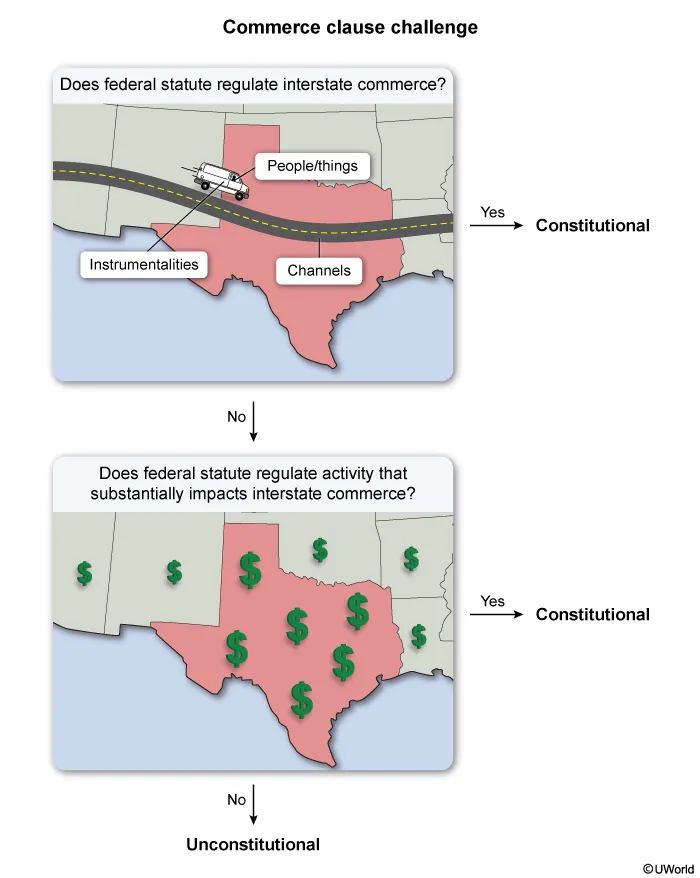
The commerce clause gives Congress broad power to regulate interstate and foreign commerce. This includes:
Since Congress's commerce power is broad, federal statutes are constitutional if there is any rational basis for concluding that the regulated activity substantially affects interstate or foreign commerce. This can be shown through express congressional findings.
Here, the federal statute regulates the retail prices of prescription drugs in the United States. Congress has the authority to regulate such products' interstate transportation, but this statute also regulates in-state purchases and sales (Choice C). Since the congressional committee found that the high cost of prescription drugs negatively impacted the nation's economy, it is rational to conclude that their aggregated in-state purchases and sales substantially impact interstate commerce. Therefore, this is the strongest argument to support this statute.
(Choice A) The taxing and spending clause empowers Congress to tax and spend for the general welfare. But regulating prices is not equivalent to taxing or spending.
(Choice B) Congress cannot regulate the prices of every domestic purchase and sale of goods since it cannot regulate purely in-state sales that do not substantially affect interstate commerce.
Educational objective:
The commerce clause empowers Congress to regulate (1) channels and instrumentalities of, (2) persons and things moving in, and (3) in-state activities that—singly or in the aggregate—substantially affect interstate or foreign commerce.
Bluebook Citations :
The owner of a new office building contracted with a well-known landscaper to design and install landscaping around the building for $30,000. The agreement was memorialized in writing, was signed by both parties, and called for a budget of $5,000 for trees, shrubs, sod, and materials. The contract required the landscaper to complete the work within six months. Due to an unexpected increase in the price of trees and shrubs, the landscaper abandoned the project and never completed any of the work.
Three years after the landscaper's deadline, the building owner sued the landscaper for breach of contract. In the jurisdiction, the statute of limitations for breach of a services contract is two years after the breach, and the statute of limitations for breach of a sale-of-goods contract is four years.
Can the owner recover damages from the landscaper?
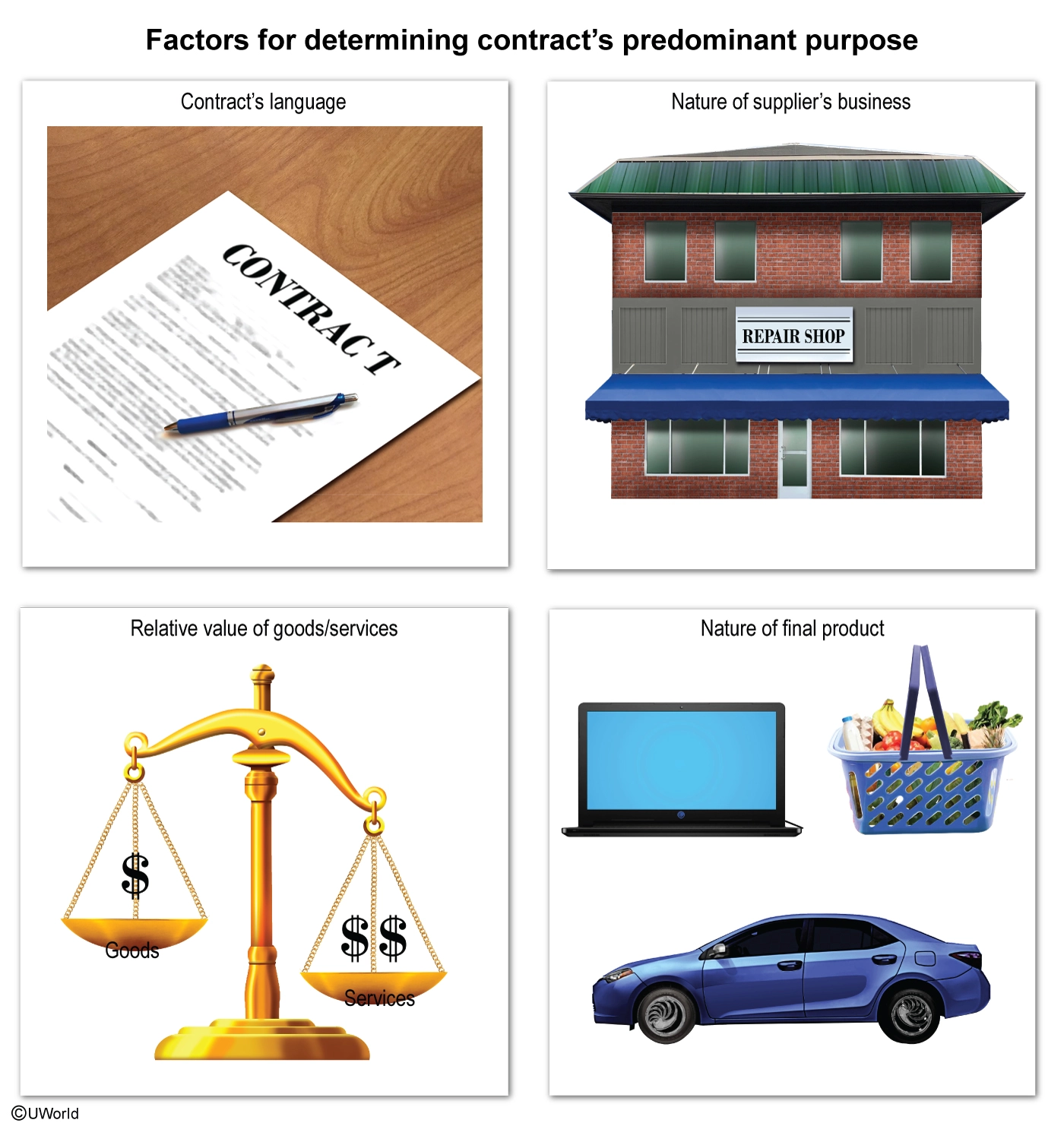
Contracts for the sale of goods are governed by Article 2 of the Uniform Commercial Code (UCC), while contracts for services are governed by common law. However, some contracts involve the sale of goods and the rendering of services. To determine which law applies to a "mixed" or "hybrid" contract, courts ask whether its predominant purpose was the sale of goods or the rendering of services. The following factors are relevant to this determination:
Here, the building owner contracted to buy goods (eg, trees, shrubs, sod) and services (ie, designing and installing the landscaping). The owner likely hired the well-known landscaper due to his skill in performing landscaping services, and the $5,000 budget for goods was just one-sixth of the $30,000 contract price. Therefore, the contract primarily calls for services and is subject to the jurisdiction's two-year statute of limitations. And since the owner sued three years after the breach, the owner cannot recover damages from the landscaper.
(Choice A) The predominant-purpose test is unnecessary when a contract is divisible—ie, when the payment for goods can easily be separated from the payment for services. But here, the contract is likely indivisible since it combined the sale of the trees, shrubs, and sod with their installation.
(Choices C & D) The predominant-purpose test focuses on the parties' reason for entering the contract—not for breaching it. Therefore, it is irrelevant that the landscaper's breach was (1) a result of an increase in the price of goods or (2) willful.
Educational objective:
Sale-of-goods contracts are governed by the UCC, while services contracts are governed by common law. When a contract calls for the sale of goods AND the rendering of services, the contract's primary purpose determines whether the UCC or common law applies.
Bluebook Citations :
A man and a woman dated for several weeks. During that time, the man repeatedly asked the woman to have sex. Each time, the woman responded that she would not have sex with the man unless they were married. One evening, the man promised the woman that they would elope the following weekend if she would agree to have sex. The woman agreed and the couple had sex. The following weekend, the man told the woman that he had no intention of eloping and only made that promise to get the woman's consent. The woman reported the man to the police, who later arrested and charged the man with rape.
Is the man guilty of rape?
In most modern jurisdictions, rape is defined as sexual intercourse with another without that person's consent.* This means that rape did not occur if the victim consented to sexual intercourse. However, a victim's consent may be ineffective if it was obtained by fraud. There are two types of fraud:
As a result, consent obtained by fraud in factum is not a valid defense to rape, but consent obtained by fraud in the inducement is a valid defense.
Here, the man falsely promised the woman that they would elope if she agreed to have sex with him. Since the woman knew that the act to which she consented was sexual intercourse, her consent was obtained by fraud in the inducement (Choices A & C). This type of fraud did not negate the woman's consent, so the man is not guilty of rape (Choice D).
*At common law, rape was defined as (1) unlawful sexual intercourse (2) with a female who is not the defendant's wife (3) against her will by force or threat of force.
Educational objective:
Fraud in factum occurs when the fraud pertains to the nature of the act itself and negates a rape victim's consent. In contrast, fraud in the inducement occurs when fraud is used to gain consent to what the victim knows is an act of sexual intercourse and does not negate the victim's consent.
A plaintiff sued a defendant for negligence to recover damages that the plaintiff suffered as a result of a crash between the two parties. At trial, the plaintiff's attorney called the plaintiff's wife to testify as to what she witnessed on the day of the crash. On cross-examination of the wife, the defendant's lawyer elicited several responses that tended to show that the plaintiff's actions constituted contributory negligence. The plaintiff's attorney seeks to ask the wife several questions on redirect examination, but the defendant's attorney objected.
What is the strongest argument that the court must allow redirect examination of the wife?
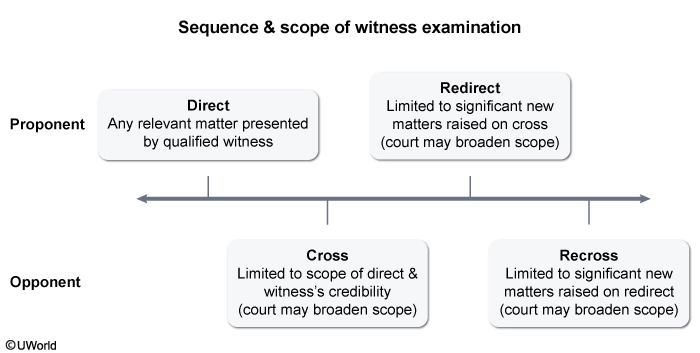
Federal Rule of Evidence 611 gives trial courts the authority to exercise reasonable control over the mode and order of examining witnesses at trial. This includes the discretion to determine whether—and to what extent—redirect examination of witnesses should be permitted. But when a party raises a significant new matter while cross-examining a witness, the court must allow the opposing party to address that matter through redirect examination.
Therefore, the strongest argument for allowing redirect examination of the plaintiff's wife is that the plaintiff's attorney seeks to reply to significant new matters that were raised on cross-examination.
(Choice A) A party is expected to elicit all significant information during direct examination of a witness. Therefore, a court need not permit redirect examination to allow the party to provide information inadvertently omitted on direct examination.
(Choices B & C) Redirect examination is generally limited to significant new matters raised on cross-examination. Therefore, a party is not entitled to redirect examination to (1) reiterate information like the necessary elements of the claim or (2) reply to all matters addressed in cross-examination.
Educational objective:
When a party raises a significant new matter on cross-examination of a witness, the court must allow redirect examination by the opposing party to address that matter.
Bluebook Citations :
Twenty years ago, a man who owned a 20-acre ranch agreed to sell all of his mineral rights to his neighbor. The man executed a warranty deed conveying the mineral estate to the neighbor, who failed to record the deed.
The following year, a woman moved her mobile home onto an undeveloped five-acre portion of the man's ranch. After the woman had lived on the property for 10 years, a local drilling company began operations on a nearby tract to drill a natural gas well. Believing that the woman owned the property, the drilling company approached the woman about leasing the mineral rights on her property and requested that the woman sign a lease of her mineral rights. The woman signed the lease as requested, and it was promptly and properly recorded. The drilling operations were successful, and the drilling company prepared to distribute profits from royalties. However, a dispute arose between the neighbor and the woman, as both parties claim ownership of the minerals.
The period of time to acquire title by adverse possession in the jurisdiction is 10 years.
In an action to determine title, is the court likely to award title to the mineral estate to the woman?
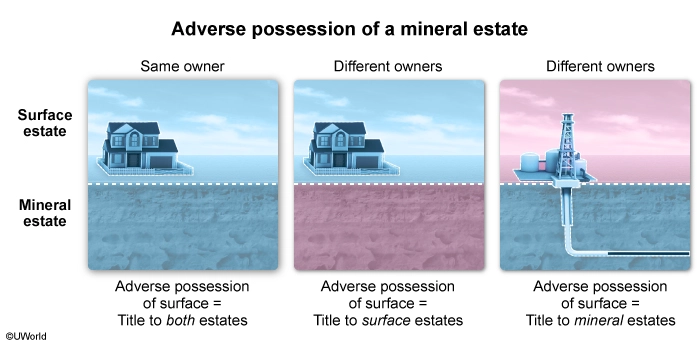
An adverse possessor can acquire title to land owned by another if his/her possession of the land is:
If the surface and mineral estates are owned by the same party, then the adverse possessor will acquire title to both estates—even if only one estate is actually possessed. But if the mineral estate has been severed from the surface estate (ie, the surface and mineral estates are owned by different parties), then the adverse possessor will only acquire title to the estate that is actually possessed. The mineral estate is actually possessed when the adverse possessor mines or drills wells on the land.
Here, the neighbor purchased the mineral estate from the man, thereby severing the mineral estate from the surface estate. And since the woman merely lived on the property for the 10-year statutory period—she did not attempt to mine or drill a well on the mineral estate—she actually possessed only the surface estate during that time (Choice D). This means that the woman did not adversely possess the mineral estate, and the court is not likely to award her title to that estate.
(Choice B) Adverse possession of a mineral estate requires the commencement of drilling or mining operations. Merely signing a lease of the mineral rights is not enough.
(Choice C) A deed need not be recorded to be valid, so the neighbor's failure to record has no impact on whether the woman adversely possessed the mineral estate.
Educational objective:
If a mineral estate has previously been severed from the surface estate (ie, surface and minerals owned by different persons), then an adverse possessor can only acquire title to the mineral estate by actually possessing the minerals (eg, by mining or drilling wells).
A teenager was riding a bicycle when she saw a classmate walking toward her. The teenager rode quickly toward the classmate, knowing that he would think she would run into him on her current trajectory. The teenager was not purposefully trying to harm or touch him. The classmate saw the teenager riding toward him and yelled at her to stop. The teenager swerved at the last moment and avoided hitting him. The classmate had a panic attack because he thought that the teenager would hit him.
Is the classmate likely to succeed if he sues the teenager for assault?
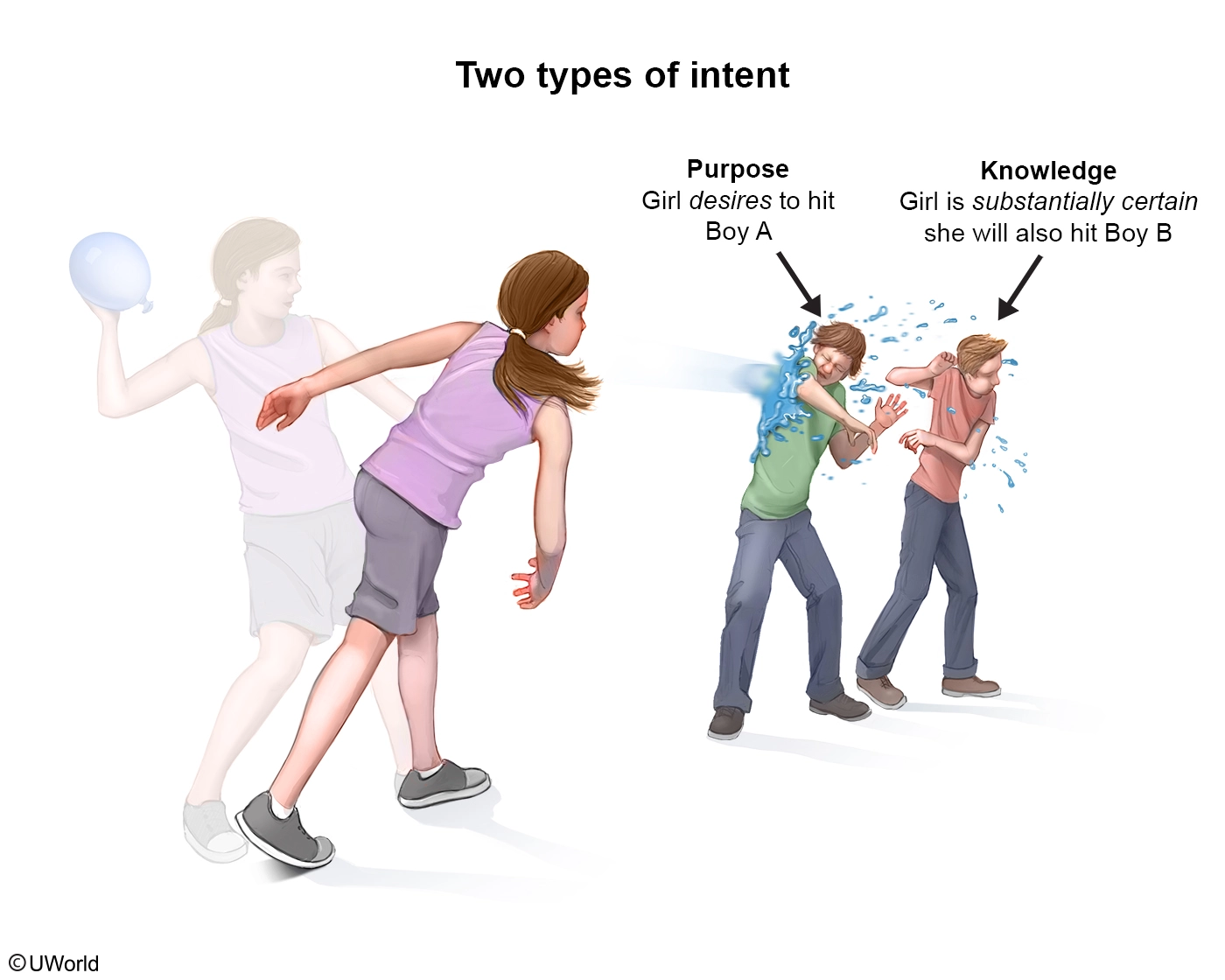
Assault occurs when (1) a defendant intends to cause the plaintiff to anticipate an imminent, and harmful or offensive, contact with the plaintiff's person and (2) the defendant's affirmative conduct causes the plaintiff to anticipate such contact. The intent requirement is met when the defendant acts with either:
Here, the teenager rode her bicycle directly at her classmate, causing him to think that she would hit him (anticipation of imminent contact). And since the teenager knew with substantial certainty that the classmate would think she would run into him, she acted with the requisite intent. As a result, the classmate is likely to succeed in a suit against the teenager for assault.
(Choice A) Assault merely requires that the plaintiff be placed in anticipation of imminent contact. Actual bodily contact is not required. Therefore, the fact that the teenager did not make contact with the classmate is irrelevant.
(Choice B) The intent to make contact with the plaintiff is a requirement for battery, but assault merely requires the intent to cause the plaintiff to anticipate imminent contact. Therefore, the fact that the teenager did not purposefully try to harm or touch the classmate does not absolve her of liability for assault.
(Choice D) Extreme and outrageous conduct (i.e., conduct that is unacceptable in civilized society) is an element of intentional infliction of emotional distress—not assault, which only requires intentional conduct.
Educational objective:
For assault, intent exists when a defendant acts with the purpose (desire) or knowledge (substantial certainty) that his/her conduct will cause the plaintiff to anticipate an imminent, and harmful or offensive, contact.
Take a look at a typical competitor sample question below. Their practice questions might parody the exam, but ours consistently meet or exceed exam-level difficulty. Their limited explanations address the right answer choice but do not go the extra mile to explain the wrong choices – so you don’t make the same mistakes on exam day.
A mother gave her land to her two kids, a son, and a daughter, as joint tenants. The son built two adjoining homes on the land. He lived in one house and rented the other. The daughter lived out of the country and never visited the land. The daughter needed money, so she sold her interest in the land to her ex-boyfriend. Her ex-boyfriend immediately hired a developer to build a third home on the land. Soon after the daughter had sold her interest in the land, she was killed in a motorcycle accident. The ex-boyfriend is now asking the court for a judicial partition of the land. The son contends that upon his sister's death, he was now the sole owner of the land.
How should the court rule?
Correct answer: B

The Multistate Professional Responsibility Examination (MPRE®) is a 2-hour, 60-multiple-choice question exam that assesses an examinee's knowledge of the ABA Model Rules of Professional Conduct. Bar candidates with MPRE scores from 1999 or later must have their scores transferred from the NCBE.
MPRE scores from 1998 or earlier must be obtained from the Illinois Board of Admissions to the Bar. Transferring your MPRE score from Illinois to another jurisdiction, or to yourself, requires you to submit an MPRE Score Transfer or Advisory Request form with a $25 fee.
Learn More
Illinois MPRE Minimum Passing ScoreBefore you can practice law in Illinois, you must also pass the Multistate Professional Responsibility Examination (MPRE®). Illinois requires a minimum MPRE passing score of 80 or more.
To be admitted to the Illinois Bar, applicants must pass the UBE with a minimum scaled score of 266 out of 400. Exam weightage is divided between the three sections as follows:
The MEE and MPT are combined for 50% of the bar exam and are graded as such. Therefore, the writing section (MEE/MPT) and the multiple-choice section (MBE) each comprise 50%, or 200 points, of your total scaled score. If you do poorly on one section of the exam, you can make up for it on the other, as long as these scores combine to a sum of 266 or more.
Note that getting 133 of 200 questions correct on the writing section does not necessarily mean you've earned 133 scaled points. Scaled scoring is employed to ensure fairness across exam versions. This scoring model is true for all three sections of the bar exam.
For example, July's exam may be more difficult than February's. It would be unfair to allow someone to pass or fail based on the relative difficulty of their exam version. Therefore, examinees' raw scores are transformed into scaled scores through a statistical method called equating. Unfortunately, the NCBE does not release data on the calculations it uses to determine scaled scores.
Illinois Bar Exam ResultsIllinois Bar Exam results are released approximately 6 weeks following the February exam and 8-10 weeks following the July exam. Results are posted on the examinee's private user accounts.
As is typical with bar exams across the country, the Illinois Bar Exam's repeater pass rate is markedly lower than the first-timer pass rate. This phenomenon is likely because many students who failed the first time haven't changed their study habits significantly.
| Exam | Overall Pass Rate | First-Timer Pass Rate | Repeater Pass Rate | Results Release Date |
|---|---|---|---|---|
| Feb. 2024 | 44% | 54% | 38% | April 8, 2024 |
| July 2023 | 70% | 79% | 27% | September 39, 2023 |
Below are the annual pass rates for the Illinois Bar Exam since 2016, divided into first-time examinees and repeaters: